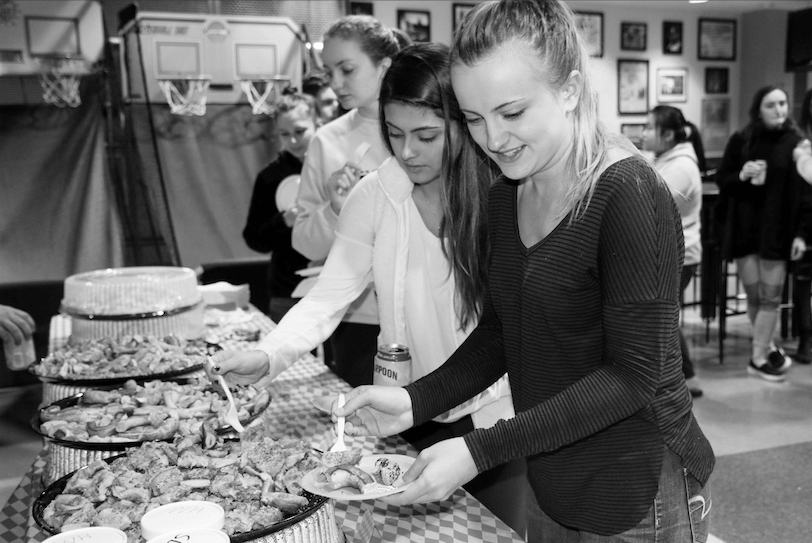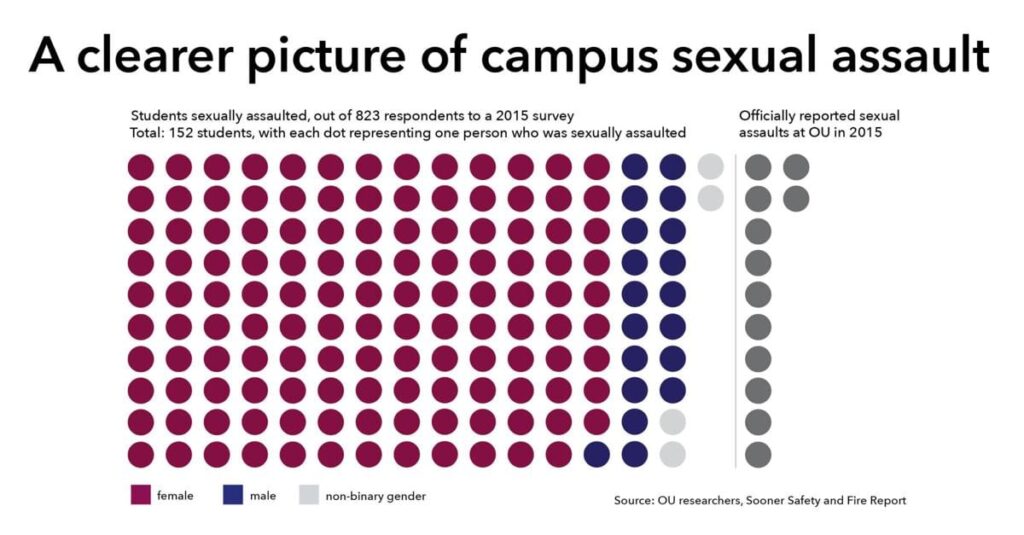Tag: Elizabeth McGinn ’21
Writer vs. Writer: DWC Program, Productive or Irrelevant to Learning Experience?
by The Cowl Editor on November 8, 2018
Opinion

by Elizabeth McGinn ’21
Opinion Staff
A liberal arts education boasts a little bit of everything, and Providence College’s iconic Development of Western Civilization (DWC) program epitomizes these liberal arts ideals. If students pay attention, they can optimize the program.
From Plato to Jefferson, and Augustine to Aquinas, the DWC program surveys the critical moments that comprise the occidental tradition. Each revolutionary pamphlet or transformative idea paved the way for society to be what it is today. No other program in the country, or even the world, can as coherently summarize all of the important aspects of Western civilization.
While some students lament that the topics covered in DWC are not useful or do not correspond to their major, the fact that every student graduates from this program is its best aspect. Sure, some math majors at other colleges will not have to read Paradise Lost, but by having all students do so, the College does its duty and provides a stellar liberal arts education—not to mention how extraordinary and well-rounded it looks on a résumé.
At other schools, students stay comfortably within their designated major and field of study. No exploration, no delving deeply into the world and the past, no mastery of other topics. With DWC, each student learns history, English, theology, philosophy, and more, while gaining a thorough understanding of how the world came to be what is it today.
Greek philosophical thought is a perfect example, for the ideas rooted in antiquity have pervaded throughout the years and had profound impact on Renaissance and Enlightenment thinking, which in turn engendered modern theories and thoughts. Who can trace such a legacy nowadays? Academics can, as well as every single PC graduate.
No class can possibly hope to cover all of Western history in such depth and detail in a semester; therefore, DWC lasts for three semesters and a colloquium semester, or four semesters and a colloquium semester for honors students. Although some students recoil at its long-lasting placement in their schedules, the precious time that is spent fleshing out lasting ideas or problems gives an opportunity for more reflection and learning.
Want to understand why modern society is sexist or racist? Look no further than the DWC texts: read how Aristotle thought women were deformed men, and how feminists dismantled the myths that Western civilization carried through the ages. See the echoings of Henry David Thoreau in Martin Luther King Jr.’s speeches and ideology that created a more equal country.
The DWC curriculum reflects PC’s commitment to a liberal arts education. Each student leaves the College with a deeper understanding and appreciation for the world around them. Be sure to admire, if not love, the DWC program now, because later, the knowledge gained will be astounding and brag-worthy.
by Alyssa Cohen ’21
Opinion Staff
Although the Development of Western Civilization (DWC) program serves as the backbone of the Providence College core curriculum, the course fails to consistently reinforce the versatile humanities background it was constructed to instill in all students.
While developing a strong command of the humanities proves essential in fulfilling a well-rounded education, DWC encumbers students from achieving their academic potential in major required classes, and fails to provide an intricate comprehension of the evolution of the Western world.
As the College offers academically rigorous classes across all fields of study, time remains finite, and inevitably, PC students are sometimes forced to cut corners in their academics.
A typical humanities major is assigned hundreds of pages of dense reading each week, math, science, and business majors must grapple with a litany of complex and abstract numerical, scientific, and economic concepts on a daily basis in order to succeed in their classes.
To that end, when students are bogged down with homework, they fail to prioritize the hundreds of pages of DWC reading, but rather focus on thoroughly completing work for classes required for their major. In turn, many PC students consistently seek shortcuts in completing their weekly DWC assignments, such as skimming the readings, studying online summaries, or neglecting to read assignments altogether.
Consequently, seminar discussions based on reading assignments often remain stagnant and unfruitful as the majority of students are merely versed in the superficial ideas of the work, if they are familiarized with the text at all.
This tedious phenomenon grows frustrating to professors, students who thoroughly completed the readings, as well as humanities majors accustomed to the dynamic text-driven discussions that occur in their major-required classes.
While the structure of DWC should elicit productive learning opportunities, the sheer amount of required reading that many students, aside from lacking the time to complete, perceive as unstimulating, ultimately hinders seminar discussions.
A potential solution to the deficiency of student drive to invest themselves in the DWC curriculum correlates with the lack of differentiation in course content. Most students express an exponentially greater enthusiasm for their DWC colloquia than the three standardized sections of the course, as they are granted a choice in the content they study.
To that end, the DWC program would benefit from allowing students the freedom to explore the material they find stimulating by implementing a colloquia-style format for all four semesters of the program.
Essentially, in order to inculcate the versatile humanities background in students the DWC program strives to foster, the curriculum requires substantial reforms.
PC Passport: Cultural Events Diversify Campus
by The Cowl Editor on November 1, 2018
Opinion

by Elizabeth McGinn ’21
Opinion Staff
Beers, bratwurst, Board of Programmers (BOP): Oktoberfest, organized by BOP on Oct. 19, featured staples of the iconic German holiday. Mixed with chattering Providence College students, the event felt like a glimpse into a quaint Bavarian village—the only difference being its location in McPhail’s.
Cultural events such as Oktoberfest allow students to explore the world while remaining on campus. No awkward Uber rides, exhausting flights, or uncomfortable train trips. Just trek into Slavin and journey across the globe.
Many of the clubs on campus, particularly those under the umbrella of the Board of Multicultural Student Affairs, often host such events.
The Asian American Club, Circolo Italiano, and Clube Portugues are just of few of the many student-run cultural organizations on campus. Each meet regularly, are active on social media, and host outreach events to spread knowledge about their cultures across campus.
Although Development of Western Civilization and other humanities classes expose PC to the wider world academically, reading about other cultures cannot compare to actually living, breathing, and tasting it. Study abroad options, such as a semester long program or Maymester, provide a transformative international perspective to students.
However, not all PC students have the opportunity to enjoy such a program. Expenses, logistics, and on-campus studies can prohibit a student’s abroad experience; others simply prefer to spend all four years on this lovely campus.
While international studies promote growth and learning, it simply is not feasible for all students.
Fortunately, PC clubs bring a taste of the world within the confines of campus.
BOP’s Oktoberfest event transformed McPhail’s, bringing the German holiday to Providence. Pretzels with a variety of sauces, German beer, and a polaroid photo station all contributed to the authentic ambiance.
A few days later, on Oct. 24, Latin Heritage Night in Ray brought students to the other side of the world.
With food originating from the Caribbean to Latin America, a delectable survey of Latin food graced dinner plates. Spanish rice, carne asada, and churros should absolutely become a mainstay staple in the dining hall.
Oktoberfest and Latin Heritage Night are just the tip of the iceberg. Each week boasts at least one event that offers a chance to experience a different culture.
Through events such as these, students taste a culture that may be far different from their own—or perhaps feel like a return home.
Not every student dwells from the same background; each student has a unique story, heritage, and tradition. The sharing of cultures engenders a closer, mutually respectful, and informed Friar Family.
Not to mention it is cost-effective for the participants. While the clubs sponsor the event, usually the food, music, and performances are free for all to enjoy. Nothing motivates starving college students more than free food.
Cultural clubs play a unique role on campus; they bridge the gap between academics and study abroad, and foster a common understanding of all the diverse backgrounds that make up the Friar Family.
By holding events that open the door to the world outside of campus, each and every student is given a passport valid for international experiences—all within the reaches of the PC campus.
What is Love? (Baby, Don’t Hurt Me)
by The Cowl Editor on October 25, 2018
Opinion

by Elizabeth McGinn ’21
Opinion Staff
Love: a four-letter word meaning intense affection for someone or something; often romantic and sexual; a religion, a lifestyle, a purpose.
The grandiose and romantic ideals passed down through art and literature provide a theoretical backbone to popular culture’s commentaries on love, yet frequently idealize the more realistic loves of everyday life. Is love really all you need?
In Plato’s Symposium, the figure of Aristophanes shares a romantic, albeit bizarre, theory on the origins of love. Years and years ago, humans were two bodies in one form, with three sexes that would appear to modern eyes as female-female, male-male, and female-male. Zeus felt threatened by these humans, and to punish them, sent a lightning bolt to tear them in half.
Consequently, humans spend their entire lives searching for their other half in order to become whole once again.
The idea of soulmates has enraptured the minds of humanity ever since antiquity. Two people, destined to love and complete one another, fill the pages of poems, plays, and books.
Sometimes, they are star-crossed, with fate condemning the couple to separate, like the tragic pair of Romeo and Juliet.
Real love never looks like the movies. There are no last-minute chases through an airport, or declarations of love emitted by the sounds of a boombox.
While love has inspired artists for centuries, what does it look like today? More specifically, what is love on college campuses?
College students generally fall into one of these four categories: single, hooking up, casually dating, or seriously dating.
Being single boasts its advantages, like staying out as late as one would want or spending money only on food for one. The other love categories have their pros and cons as well.
Hook-ups entail one-night stands, friends with benefits, and any connection that includes sexual activity without the emotional support of a relationship.
This form is popular among students for instant sexual gratification and minimal responsibilities, but can often lack in emotional depth. Apps like Tinder and the party life on campus enable this category to thrive.
Casual dating and serious dating blend into each other and overlap. Casual dating, if successfully connecting with someone, usually develops into a serious relationship.
Casual dating involves formal dates, but no exclusivity, whereas serious dating resembles the typical exclusive and long-term attachments. In the latter category, love most often flourishes.
“Love is when the girl you like cuts her hair and your feelings don’t change for her,” said Sebastian D’Ambrosio ’21.
In other words, physical beauty, while perhaps providing an initial attraction, takes the passenger seat to personality, ambitions, and values. The essence of an individual supersedes material looks, and what is more romantic than being loved for who you truly are?
While cliché romantic comedy tropes cannot correlate to real life experiences, love is in the little things: bringing your Dunkin’ order after oversleeping, sending memes to each other on Instagram, and stealing each other’s clothes.
If you find yourself choosing a night in, full of cuddles and laughs, over a wild night out, you just might be falling in love.
RISE Up Against Sexual Assault
by The Cowl Editor on October 4, 2018
Opinion

assault is extremely low. Photo courtesy of AICU Rhode Island.
by Elizabeth McGinn ’21
Opinion Staff
Dr. Christine Blasey Ford’s horrifying account of sexual assault allegedly perpetrated by Supreme Court nominee Brett Kavanaugh has reverberated throughout the nation. Now joined by two more accusers, Dr. Ford’s testimony brings to light the role of delayed reportings, credibility, and how the #MeToo movement can impact Washington.
Although the #MeToo movement has revolutionized the acceptance of speaking out against assault, Washington has largely been left unscathed by repercussions. Hollywood has witnessed the successes of the #MeToo movement with the firings of Harvey Weinstein, Louis C.K., Kevin Spacey, and many more, yet politicians have yet to face repurcussions.
For Providence College students, the new student advocacy organization RISE attempts to tackle this sensitive topic. RISE, an acronym for reclaim, inform, support, and empower, seeks to educate the student body on consent and provide a supportive atmosphere for survivors.
The vote to continue the process of Kavanaugh’s nomination threatens to maintain the status quo of ignoring serious claims by women in politics, echoing Anita Hill and Clarence Thomas. By investigating the circumstances around the alleged assault, the Senate has the power to set a strong precedent against sexual predator behavior.
For many survivors, Dr. Ford’s account and subsequent reactions by politicians and media reflects a reality of victim-blaming. While Rachel Mitchell’s interrogation of Dr. Ford’s testimony attempted to put her on trial, Dr. Ford was collected, eloquent, and most importantly, credible.
Many are skeptical of Dr. Ford’s delay in reporting. The main argument against her story is the question of why she waited for the seemingly 11th hour of Kavanaugh’s nomination process.
Brianna O’Shaughnessy ’19 stated that reporting is “all about the individual and how they process their own trauma.” Survivors of sexual assault grieve, process, and grow in many different ways. While some may opt to report instantly, the shock and trauma may be suppressed for years—which may be triggered when an abuser is up for a Supreme Court nomination.
Sexual assault can happen to anyone—men, women, LGBTQIA, people of color—and we must take all accounts seriously.
O’Shaughnessy, the founder of RISE, explains that RISE is “all about letting the survivor chart their own course and being able to reclaim the control that was previously taken away from them.” Future plans include teach-ins, speakers, and education about sex and consent to increase safety and create an accepting atmosphere for all students.
At a Catholic college, sex itself is a sensitive topic, let alone sexual assault. While students ideally remain abstinent until marriage in the Catholic faith, the reality reflects the culture of all American colleges—a mixture of hookups and dating, often including sex. So when a survivor comes forward to report his or her assault, the fear of victim-blaming or violating a Catholic belief can overcome the need for justice.
RISE aims to simplify the process of reporting by advising and educating us on students’ rights according to Title IX and the Clery Act. For those interested in joining RISE’s mission to end sexual assault on campus and aid survivors, meetings are held on Wednesdays at 6 p.m. in Feinstein 203.
The reality is that sexual assault is an issue in this nation, in this city, and on this campus. Be part of the change. Stand up, speak out, and most of all remember that you are not alone.
Tangents and Tirades
by The Cowl Editor on September 27, 2018
Opinion

Wearing White After Labor Day
Earlier this month, we celebrated Labor Day, a national holiday dedicated to American workers of the past and present. However, this holiday is also known for something else—it marks the beginning of the infamous fashion rule; “no white after Labor Day.”
This mandate is often blindly obeyed, though most people are unable to explain its origin. But if people investigated the genesis of this fashion rule they would see little relevance to present day.
This unwritten dress code developed in the 1950s in the northern urban areas of America. During summer months, wealthy people would leave the city to vacation elsewhere. They would pack a vacation wardrobe, typically consisting of white clothing made from lighter fabrics. Once their time of leisure came to an end and they returned to the city, they would transition back to their darker-colored work attire. Essentially, this fashion rule became a way to distinguish the wealthy, who were able to vacation, from the working class, who were unable to experience that luxury.
Times have changed significantly since the 1950s, and the justification behind this fashion rule is outdated. No longer is white clothing an indicator of social class. White clothing should be worn because it is practical and pleasing to the eye. If you look good and feel good in an outfit, it doesn’t matter what time of the year it is.
So, don’t pack away your white jeans and ivory dresses just yet. Antiquated rules shouldn’t dictate your style, especially if you are wearing an outfit that makes you smile at yourself in the mirror.
-Kelly Wheeler ’21
The Importance of Foreign Language
We can access the other side of the globe with the click of a button, and an airplane can travel anywhere on the planet. With this world growing closer, foreign language is more necessary than ever before.
While those who are opposed to the study of foreign language argue that English acts as a lingua franca, languages are a focal point of a nation’s pride. Many people, even if they do speak or understand English, prefer to speak in their native tongue. Language is an important part of culture and history and refusing to acknowledge this debases the complexities of the world’s history.
A foreign language major or minor can supplement any field of education. Business majors can develop personal relationships when a client’s native language is used, biology majors can more easily interact with patients, history majors are able to understand cultural nuances better, the list is endless.
Upper level courses satisfy oral and intensive writing requirements, and the foreign language departments accept students across all levels. Students should take advantage of this opportunity in order to educate themselves and take advantage of the benefits of foreign language.
A deeper connection begins at bonjour.
-Elizabeth McGinn ’21
Netflix Detox
After binging 90210 for four days straight, constantly going to bed at 3 a.m. and waking up for my 8:30 a.m., I decided this new habit had to stop.
Like millions of Netflix users around the world, my addiction began with the seven-day free trial that is heavily advertised throughout the internet.
As innovative as Netflix is, its downside is that it can easily become a slippery slope to immense dependency and procrastination; something college students are prone to.
Quitting Netflix, or even reducing the amount of time spent watching it, immediately increases the amount of sleep you get and decreases how long you take to finish your work.
Netflix can act as a barrier in your social life, as many students would rather stay at their dorms watching a movie than going out to Bingo, or a soccer game.
So save the money! College students have enough economic hardships as it is. Maybe for some people paying $7.99 monthly is not a hefty price tag, but yearly it comes up to $95.88, and this is only the basic plan. That could be money that goes into your bank account, or to other overriding necessities.
“Netflix and chill” takes on a whole new meaning, as many people rely on Netflix to destress after a long day. Moreover, its downside is that it acts as a distractor and a tool for procrastination.
Do the pros outweigh the cons? That is for you to decide, but it is certainly beneficial to do a Netflix detox to grasp how much time you spend on it per week, and to determine if it is worth your time and money.
Angela Bueso ’22
Name-Brand Culture Comes With a Cost
by The Cowl Editor on September 20, 2018
Opinion

by Elizabeth McGinn ’21
Opinion Staff
It is 11 a.m. on a Saturday in September. Girls stroll by in flashes of neon pinks, blues, greens, and whites, arranged in nautical or animal print dresses or skirts, paired with Jack Rogers sandals. Guys don tee-shirts embossed with a smiling whale and matching bold-colored Bermuda shorts.
Today is Golf Party.
Lilly Pulitzer dominates the fashion scene of Golf Party, and it is easy to see why: in addition to fitting the “golf” theme, the outfits are vivid, eye-catching, and perfect for an Instagram post.
Instantly recognizable, anyone with a slight idea of campus fashion can immediately spot a Lilly—or a fake.
The desire to fit into the image of the preppy collegiate student can be overwhelming, and the cost might just break the bank.
So why is the cost of conformity on campus so high?
College is already expensive, and with tuition exceeding $45,000 a year, many families live by the bare minimum just to afford it.
When droves of girls sporting $200 dresses waltz by, combined with endless Instagrams on Eaton Street, wearing Lilly can feel like a requirement to participate.
Instead of dropping hundreds of dollars on a single outfit, this money can go toward savings or food.
The obsession with name-brand clothing is not limited to Lilly Pulitzer: Vineyard Vines, Lululemon, Canada Goose, Birkenstocks, Michael Kors, Jack Rogers, Nike—the list is boundless.
Take a walk around the PC campus on any given day, not just on Golf Party, and chances are that several of these brands will be spotted. PC gear can also be thrown in the mix; like all the others, the price tag is hefty.
Wasting a week’s paycheck on expensive clothes for a party or two should not be a requirement to be a part of the PC community.
While some students at the College are fortunate enough to own a wardrobe stocked with the latest fashions, most pick and choose which to purchase, or simply live without it.
The name-brand clothes clearly delineate among the students who fall into which category, and friend groups follow suit.
Exclusivity based on clothes is a massive problem that stunts potential relationships on campus.
This begs the question: what can we do about it?
Being mindful of the situations of others is the best way to start. Not everyone is in the same boat at PC.
Respecting students from all walks of life and financial circumstances is crucial to forming a supportive and inclusive Friar Family.
A little empathy and understanding goes a long way.
Every student is a complex and one-of-a-kind individual, and clothes can be an outlet for self-expression and creativity.
PC does not have a uniform, and the unofficial uniform of name-brand clothes does not necessarily reflect everyone’s story and personality.
Skipping the Lilly or Vineyard Vines for a week or two may open doors to new and meaningful friendships, based on who a person is rather than what he or she wears.
Although the cost of conformity is high, inclusivity is priceless; be aware and sensitive of name-brand culture on campus.
